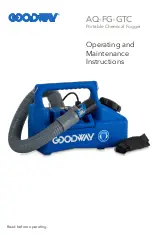
Micro Meg™ Pocket Megohmmeter
Operation and Maintenance
Figure 1.
Micro Meg Pocket
Megohmmeter
Description
The Charleswater
Meg Pocket Megohmmeter is a
portable test instrument designed
for measuring both surface and
surface-to-ground resistance of static
dissipative and conductive materials.
Seven color-coded LEDs, read from
right to left, easily identify static
dissipative and conductive ranges.
The Micro Meg will test materials
with surface resistivity of 1x10E5
to 1x10E10. This test instrument is
ideally suited for Quality Control and
Field Service personnel as well as
for use in routine auditing of your
ESD protective materials. The Micro
Meg features simple one-button
operation and a 9V battery for ease
of use and maximum portability. This
auto-ranging instrument weighs only
six ounces. The high-impact plastic
case ensures durability despite the
meter’s light weight.
The Micro Meg has not been
designed to meet IEC 61340-4-1
test equipment requirements and
therefore measurements obtained
with this device may not agree with
measurements taken according to
the EN 61340-5-1 Test method A.1
test procedure. This test instrument is
intended for use only as an auxiliary
tool for monitoring surface resistance
performance.
If you are interested in obtaining a
meter which does meet all the test
equipment requirements of IEC
61340-4-1, we recommend our model
For more information on this product
ask for Techical Bulletin
Installation
Remove the meter from the carton
and inspect for damage. Each unit
should be fully charged and includes:
1 Micro Meg Pocket Megohmmeter
1 Surface-to-Ground, cord assembly
1 9V battery
Properly store the megohmmeter and
its component assemblies when not
in use.
Operation
The Micro Meg will perform Surface
Resistivity and Surface-to-Ground
resistance measurements. Work
surfaces and materials to be tested
should be cleaned prior to testing
to ensure that surface dirt and
contamination do not affect results.
It is recommended that non-silicone
and non-alcohol based cleaners
such as Charleswater’s Reztore™
Surface and Mat Cleaner be used for
regular cleaning of ESD protective
work surfaces. When non-ESD
surfaces are being used, Reztore™
Topical Antistat is recommended for
eliminating static charge generation.
Surface and Surface-to-Ground
resistance readings are indicated by
the series of LEDs on the face of the
meter. The LEDs are read from right
to left as follows:
1. RED
– Meter on and battery
functioning
2. GREEN – 5 x 10E10
3. GREEN – 1 x 10E9
4. GREEN – 1 x 10E8
5. GREEN – 1 x 10E7
6. YELLOW – 1 x 10E6
7. YELLOW – 1 x 10E5
Each LED indicates one order of
magnitude of resistance. If the test
surface is conductive to less than
10E5, all the LEDs will be lit. If
it is neither conductive nor static
dissipative, only the red “On” LED will
be lit.
Surface Resistivity
Measurements
Surface resistivity measurements
are made using only the meter
without the cord assembly. When
the white button is depressed a test
voltage of 9 VDC is applied to the
meter’s center electrode. The second
resistivity electrode will supply the
resistance bridge and provide the
measurement. To perform surface
resistivity tests, follow these simple
instructions:
A. Check battery operation by
depressing the white button on the
center of the megohmmeter. The red
“On” lamp at the far right should light
to indicate that the unit is functioning
properly.
B. Place the meter on the surface
being tested. All three electrodes
should make contact with the surface.
C. Press the white button. The
surface resistance will be indicated
by the number of LEDs which light
up. The more lights illuminated,
the greater the conductivity of the
surface. The measurement is in
ohms/square.
Made in the
United States of America
TECHNICAL BULLETIN PPE-5046.E
Unit 17. Millbrook Business Park, Sybron Way • Crowborough, East Sussex TN6 3JZ United Kingdom
Phone: 00 44 (0) 1892-665313, Fax: 00 44 (0) 1892-668838 • Internet:
PPE-5046.E
September 2011 Page 1 of 3
© 2011 CHARLESWATER LTD.
Figure 2. Cleaning the work surface
before testing.





















